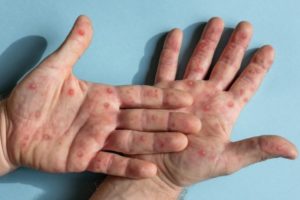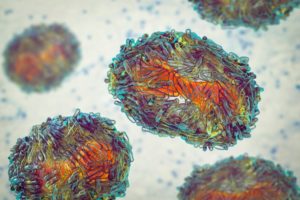What's On This Page?
ToggleI don’t really want to talk about this because who needs more to worry about, but since the World Health Organization has recently declared it a global health emergency, I’m going to devote today’s blog to it.
I’m referring to the newest disease called “Monkeypox.” Part of the illness causes lesions similar to smallpox, but milder, and it is self-limiting for most people. The duration is usually one to four weeks. Fatalities are extremely rare. The virus is transmitted almost exclusively in men having sex with other men and it is not very common at all. Recently the CDC posted a warning to gay and bisexual men which you can review HERE.
Very few, if any, women have contracted the condition. It’s about 95% males. It does not spread to women very easily but it can. An interesting point though, the television channels constantly show women getting vaccinated, and on my photo stock imaging sites, all I can download are pink-colored images, and almost all graphics show females in them. So after I download the images, I am neutralizing the color of my graphics to turn them white, blue or grey because monkeypox is RARELY spread to women and the pink color implies that it does, at least to me. All that “pink” could invoke panic or fear in women and there’s no need to do that.
Here is a link to Safer Sex, Social Gatherings, and Monkeypox for more information.
Also, to correct some information I have seen online, monkeypox has no relation to chickenpox. They are not even remotely related, other than both of them have the suffix “pox” in them! The “pox” refers to lesions or pustules that many diseases cause.

I want to assure you, that almost everyone in this current outbreak is alive and well. You’ll probably never get this. I doubt you will even know someone who gets infected with this! Nevertheless, monkeypox is a hot topic online, and sadly, it makes news every night on almost every network. You can’t turn the TV on without hearing about it! I worry about the fear and do not wish to disseminate any fear so today’s article is devoted to answering questions and allaying your concerns.
Here are 10 important facts about monkeypox.
Let’s go through some of the most frequently asked questions in your mind:
1. Is this going to kill people all over the world similarly to corona?
Answer: No, not like covid did. This is nothing like you’re assuming it will be, or how it is portrayed in the media. In my opinion, will be NO monkeypox lockdowns or anything like that! It is simply not spread that way, and you have nothing to get crazy-scared about.
2. Is it sexually transmitted?
Answer: Yes, it can be transmitted this way. Almost all cases have been spread this way. If a person is infected, then the virus will be found throughout their body. The modes of transmission include semen, saliva, urine and/or feces. Here’s the STUDY that was just released where DNA samples were tested. The method of transmission, as you might expect, include prolonged face-to-face contact, kissing, sexual contact, or exposure to sex toys. Touching things after touching your lesions can spread them. Sharing bed sheets with an infected person could spread monkeypox too.
Other modes of transmission come from animals. According to the World Health Organization, “Animal-to-human (zoonotic) transmission can occur from direct contact with the blood, bodily fluids, or cutaneous or mucosal lesions of infected animals.”

3. How many monkeypox deaths have been reported in the USA?
Answer: This number will change with time, but as of August 2, 2022, none in the USA.
In the entire world, only 10 deaths have been reported with the current outbreak. The number of deaths shared in the media as being “over 16,000 deaths” is because someone thought it would be a good idea to count the deaths from serious outbreaks that occurred all over the world, and to count over decades, since either 1958 when it was discovered, or maybe 1970!
The date of 1958 vs 1970 is not clear because the citations vary across various sources. Nothing is really clear about the death count or the case counts due to inconsistencies from the trusted resources.
Contrast these 10 Monkeypox-related deaths to the 805,000 heart attack-related deaths last year, and annually according to the CDC. Furthermore, every 34 seconds someone dies from a heart-related problem. Exponentially more deaths due to heart attacks, but with that, it’s just crickets!
4. Why is it named monkeypox?
Answer: The virus was first identified from those fuzzy creatures! It was first discovered in 1958 when outbreaks occurred in monkeys that were being used for clinical research. According to the CDC, no one has figured out the actual source of the disease to this day. They do confirm that monkeys and rodents harbor the virus and infect people… that is known as a zoonotic disease. Gerbils and hamsters are the most frequent carriers of monkeypox, despite the name “monkeypox.”

5. How widespread is monkeypox?
Answer: As of August 2, cases of monkeypox have been detected in about 80 countries. I don’t know if that means they’ve detected it in animals, or in humans. The citation does not state “humans” and that makes a difference.
6. What are the symptoms?
Answer: Fever is always part of the infection because that’s the body’s mechanism to fight pathogens. Also included are headaches, muscle aches, and other flu-like symptoms. Lesions and ulcers occur as well, usually on the face or genitals. If you develop these issues, call your doctor, and limit contact with others.
If your sexual partner was diagnosed with monkeypox (or developed an illness with the symptoms listed above), then you should avoid contact with other people and presume you yourself can now spread it.
If you’re uncertain and want to test for this, it is not a blood test. It is actually a lesion swab. They take a swab off of your rash or growth and then test using that. The use of other tests such as blood or saliva will not work, even though you might see graphics or things on TV showing blood tests. Incorrect! Again, monkeypox testing only requires a lesion swab.
Recommendations
Use lesion swab samples when testing for the monkeypox virus.
7. Can you transmit this to your pets?
Answer: Ok, so this is a little hard to defend but I’m going to say NO. However, the CDC reports that it can be given to your pet, but I disagree unless of course you’re putting your pet somewhere it does not belong! Monkeypox is a zoonotic disease, and as such, animals transmit to humans not the other way around. In other words, you can’t give a tick the Lyme disease, or a dog rabies, you aren’t going to give West Nile to a mosquito, lol, so it’s a bit ridiculous. But to be smart AVOID contact with your pets if you’re sick, that’s common sense.
But I suppose if you have open ulcers and raw lesions in your nether regions, and your pet gerbil nuzzles up in there (while you’re naked and oozing with lesions), then yeah, the animal will of course get it! Or maybe if you put your hands all over your pet dog… or it sleeps in the bed with your contaminated sheets! But who would allow this to happen to their pet while covered in infectious?!
With zoonotic infections, the critter infects the human, not the other way around. It is transmitted to people from wild animals mostly, for example, exposure to your a gerbil, hamster, rabbit, monkey (and less often a dog or cat). Of these, rodents have the biggest reservoir and therefore they are the most common transmitters.
If you’re ill with monkeypox have someone else take care of your pet and be mindful of them crawling all over you if you have lesions.
So while the CDC may be technically correct with stating publicly that a pet can get it from an infected human, I feel it’s ridiculous to think this scenario is widespread. I also think there are a bazillion pet owners right now who might be worried and you have nothing to worry about!

8. What can we all do to minimize the spread?
Answer: If you develop a fever, skin rash or ulcer, or raised lesion (or you feel sick) avoid close contact, including sexual contact until your physician has confirmed what illness you have and provided adequate treatment. There are more suggestions HERE.
9. Should you get vaccinated?
Answer: That’s your call. The condition is self-limiting. The vaccine made by Jynneos® is a smallpox vaccine. It is not specific to monkeypox but rather created from the vaccinia virus, which is an orthopoxvirus. And monkeypox is a type of orthopoxvirus. So discuss the potential benefits against the risks with a doctor you trust. The FDA released THIS STATEMENT about the Jynneos vaccine that just approved. It’s a shot, and you need two of them. If shots are not your thing, or you are considered “immunocompromised,” consider not engaging in activities that increase your exposure to monkeypox, and avoid interactions with high-risk individuals until the virus is better controlled.
10: What is the USA case count?
Answer: It is unclear. The CDC lists the cases of monkeypox as more than 7,500 cases on this date, and you can visit their website for live updates. I stared at the CDC web page and refreshed it continuously over 2 hours. It was like a ticker! The case number bizarrely rose every hour by exactly 200 cases per hour within the USA!
The problem with the case count is in discerning the exact monkeypox number. That’s because the CDC has included case counts of “orthopoxvirus infections” as well as monkeypox. And the othropoxviruses category includes smallpox (variola), vaccinia virus as well as cowpox virus, and others. So the monkeypox case count is rather opaque. They also do not state “human” but I think we can assume they’re referring to people, not animals where the virus is more likely to spread.
There are many orthopoxviruses. Take a look at this graphic I pulled from the National Library of Medicine.
Here’s the CDC PAGE where you can learn about those orthopoxviruses I mentioned above.
What about the history of the condition? It is interesting, and this is where you can see the PAST CASES.
10. What to do if you think you’re infected.
Answer: Avoid close contact with others to minimize spread. Call your physician to make an appointment to get help, or visit an urgent care center. Follow your doctor’s orders. For home relief of the mild flu-like symptoms, consider over-the-counter analgesics and antipyretics for fever and pain. Send someone into the pharmacy to get your products so you don’t infect anyone else. Remember, touching things after you’ve touched your lesions can spread it.
Final Comments on Monkeypox. Your immune system allows you to fight harder, and get well sooner, but a well-running immune system will not prevent infection. On the topic of immunity, you can read these articles for more information:
How to Make Your Immune System
5 Truly Awesome Ways to Boost Immune Function
We All Have Some Degree of Autoimmune Disease

Suzy Cohen, has been a licensed pharmacist for over 30 years and believes the best approach to chronic illness is a combination of natural medicine and conventional. She founded her own dietary supplement company specializing in custom-formulas, some of which have patents. With a special focus on functional medicine, thyroid health and drug nutrient depletion, Suzy is the author of several related books including Thyroid Healthy, Drug Muggers, Diabetes Without Drugs, and a nationally syndicated column.



